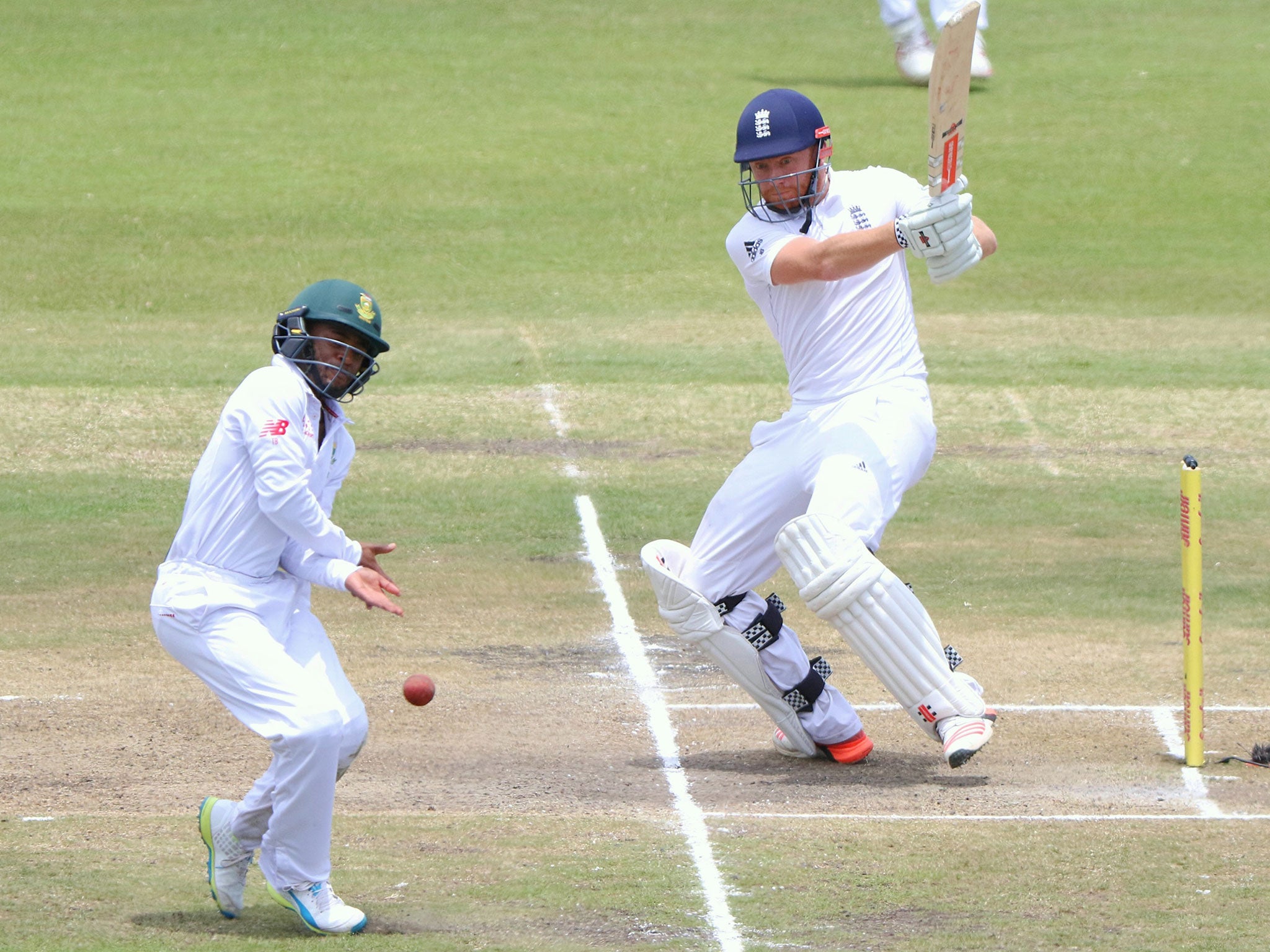South Africa vs England: Steven Finn strikes late with three wickets to put England on course for first Test victory
England 303 & 326, South Africa 214 & 136-4

South Africa have a history of blocking the bejeezus out of it to secure a draw. It is why England could take nothing for granted when they embarked on Tuesday on trying to bowl out the opposition with 140 overs at their disposal in the first Test. It was why they still could not when the fourth day closed with their advantage significantly enhanced.
Perhaps after four days of directing proceedings the tourists are still favourites, perhaps with only six wickets left to take there is abundant scope for optimism on the tourists’ part that they can go to Fortress Cape Town with a lead in the series. But obduracy is as common as the braai in this country.
South Africa’s cricketers – and probably everyone else – see it as a divine obligation to make sure that they leave everything out there before defeat can be contemplated, let alone conceded. Set 416 to win by England, they were 136 for 4 at the end of the fourth day. They will by no means see their task as impossible.
England made a vital breakthrough in the final over of the day when Faf du Plessis, who has been this way before, was removed by a brutal lifter from Steve Finn. It was, dare one say it, the type of ball that wins matches when the batsmen are determined to avoid everything possible to get out.

Much to England’s annoyance, however – a feeling that will persist until the job is done – Du Plessis’s long-time partner, AB de Villiers remains in occupation. The opportunity to dislodge him as well was missed. With the fourth day drawing to its end, down the wicket went De Villiers to Moeen Ali, only to misjudge the flight as the ball turned sharply past him. The tourists’ wicketkeeper, Jonny Bairstow, saw the ball grip, moved both gloves towards it but missed it as it whizzed past him on the left side.
Bairstow beat the ground in self-admonishment, aware in that horrible moment of what he might have cost his side. It undid some, though not all, of the good work he had done in assembling a dashing, selfless innings of 79 earlier in the day which had brought a dose of essential acceleration to the third innings.
The selectors make a kind of a pact in these matters. They usually know that they do not have the best wicketkeeper in the side, in which case they must factor in cock-ups both big, like this one could prove to be, and small, as Bairstow’s was in the first innings when his belated, ham-fisted dive led to a dropped catch. In defence of the culprit, it was a difficult stumping to negotiate, with the ball drifting away and then turning sharply past the batsman with Bairstow unsighted.

Pick the best keeper, whoever that might be – and it probably is not Jos Buttler either – and you risk sacrificing runs. It was, lest we forget, Buttler’s shortage of Test runs which prompted his dropping from the team during the series against Pakistan in the UAE last month.
It was Bairstow’s lapse which made Finn’s inspired ball so welcome. They needed something just then to make themselves believe again. South Africa have probably come to relish actions such as these like latter-day sieges.
On this ground in 1999, having been asked to follow on by England, they batted for a little more than two days to draw the match. In Adelaide three years ago, on 77 for 4 overnight, they resisted on the final day, batting for 148 overs in all.
And last month in Delhi, in a particularly futile exercise which they would see as a day at the office, they scored 143 in 143.1 overs. On both the latter occasions, De Villiers and Du Plessis were in attendance for long periods.
Perhaps not surprisingly, grabbing at the prospect of the present as it came into view, England were a little too eager at the start of South Africa’s innings. In searching for quick wickets they lost their discipline a little. Early boundaries accrued. There was talk of a turnaround South African victory.
It took an intervention from Ben Stokes to end South Africa’s first opening partnership above 50 in eight innings and it was only the 11th over. Stiaan van Zyl, another product of the modern fetish for makeshift openers, chose the wrong line and, for the second time in the match, had his off stump trimmed from round the wicket.

The loss of two wickets in quick succession might have derailed South Africa. On the other hand, that sort of talk is fanciful. Hashim Amla, who is struggling for any kind of rhythm and appears jerky at the crease where he was once fluent, flashed at a ball outside off from Finn and was caught by Bairstow darting to his left.
Three runs later, Dean Elgar, the unbeaten centurion from the first innings, prodded at one and was held high by Joe Root at second slip.

Although De Villiers was not afraid to play the odd shot in anger, South Africa’s plan for the last hour was to play for the morrow. But it did not quite work.
The regaining of discipline by the bowlers was integral to England’s position. It had served them well in the morning when the loss of early wickets in their second innings did not distract them. Root was clearly vexed with himself for being out again failing to convert into a hundred, James Taylor was stumped on the charge.
Bairstow was assertive from the start – he hit nine fours and three sixes – and played as well as he has done for England since his accomplished 95 against these opponents at Lord’s in 2012. He was considered a batsman pure and simple then, before wicketkeeping complicated his international life, probably for ever.
Join our commenting forum
Join thought-provoking conversations, follow other Independent readers and see their replies
Comments